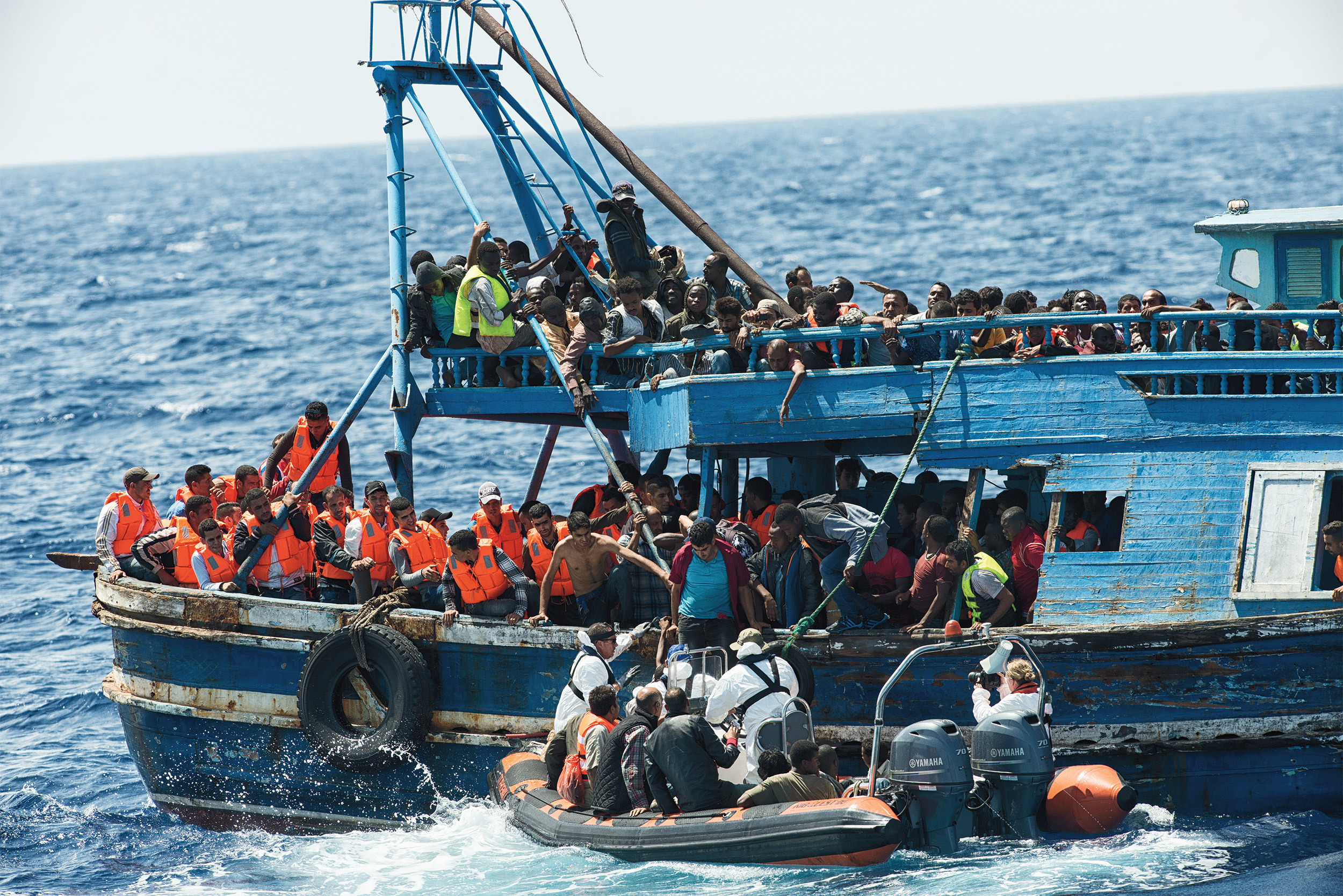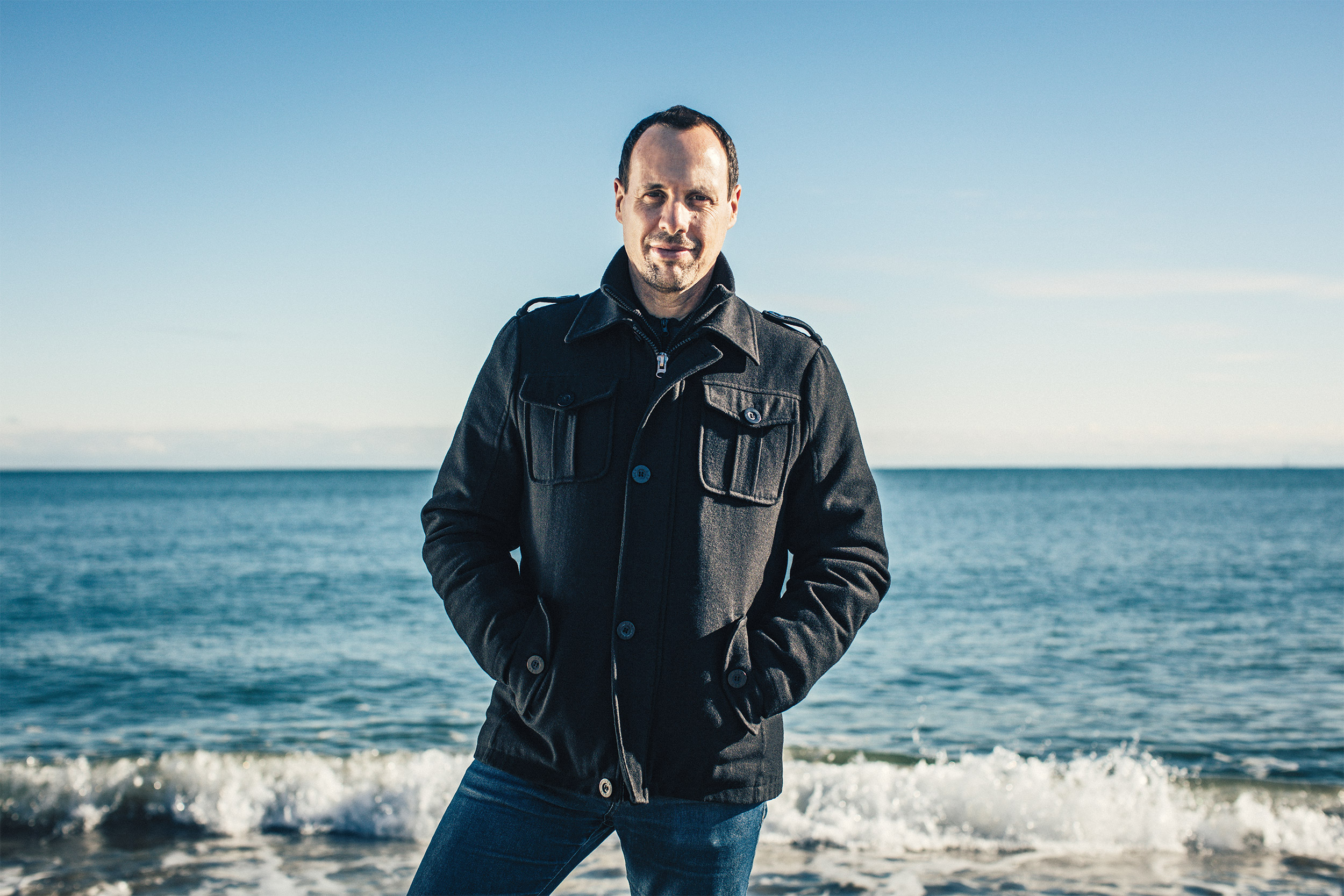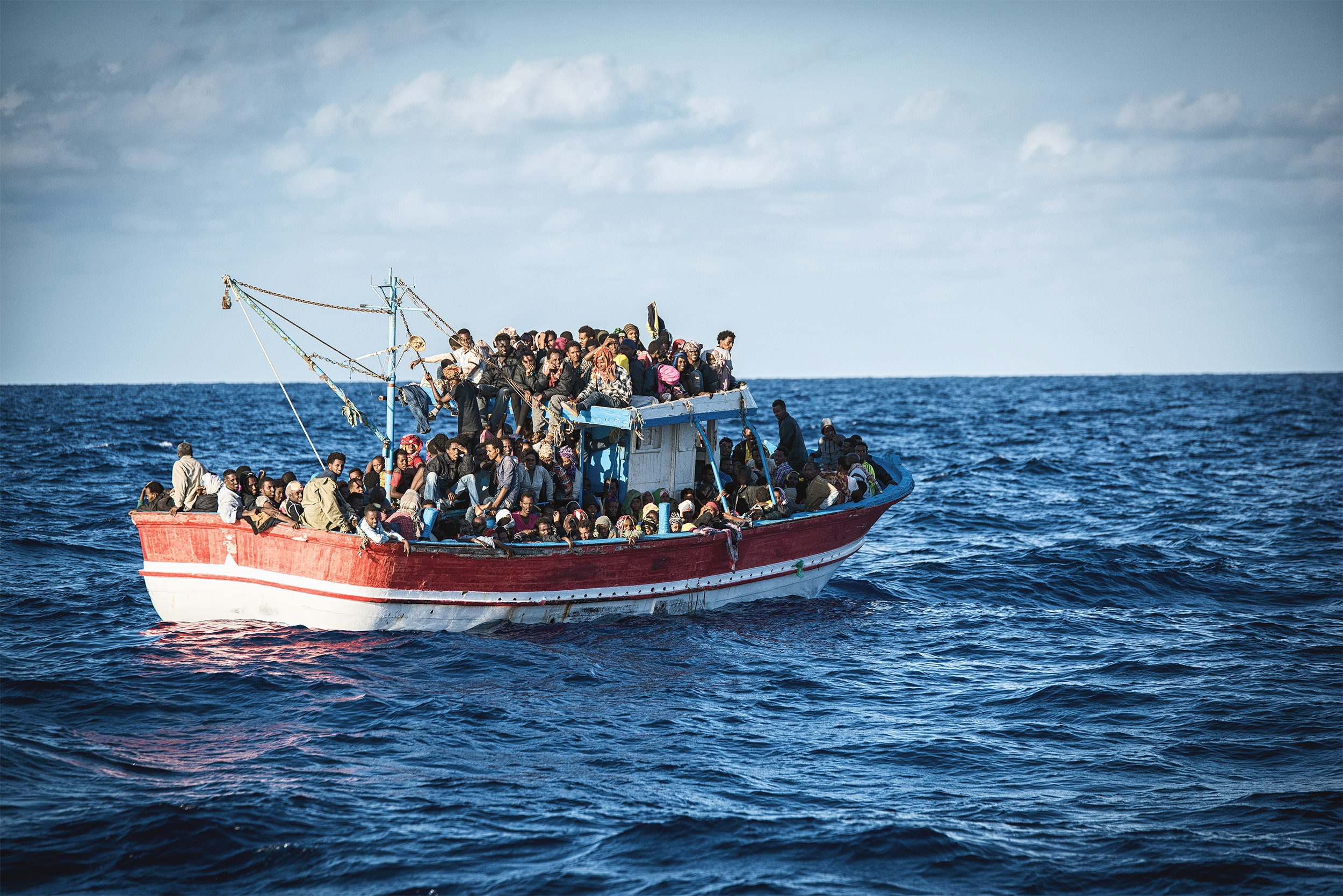
On Aug. 26, a Swedish coast guard ship rescued about 450 people from a wooden boat.
Photo by Gabriele François Casini
None if by sea
Radcliffe fellow whose NGO assisted 77,000 Mediterranean immigrants believes the current moment will pass — eventually
Just north of Libya’s territorial waters, a rescue boat operated by Doctors Without Borders (Médecins Sans Frontières/MSF) awaits the call. A small wooden fishing boat, sometimes a rubber dinghy, overloaded with refugees to five or six times its capacity, is in distress — in danger of capsizing in the rough Mediterranean waters. Equipped with a search-and-rescue crew and medical team, MSF responds, locating the distressed boat, evacuating the men, women, and children and treating them for ailments from dehydration to torture wounds they’ve sustained in arbitrary detention in Libya. MSF then transports the refugees to a safe port in southern Italy.
In the years of the NGO’s presence in the Mediterranean — from 2015‒2018 — MSF executed 425 of these rescue operations and assisted 77,000 people. As its director of advocacy and communications, Hernan del Valle RI ’19 witnessed the crisis up close, helping oversee MSF’s search-and-rescue operations for people fleeing conflict and famine in parts of Africa and the Middle East — and watching as Europe slowly but decisively turned its back.
From his third-floor corner office in Byerly Hall, on Radcliffe’s campus, del Valle — who is the 2018–2019 Rita E. Hauser Fellow — is stepping back and trying to make sense of what transpired during those tumultuous years when MSF stepped in to fill the void that Europe left when its policy toward refugees crossing the Mediterranean shifted from rescue to obstruction. Del Valle wants to better understand where things went wrong: how it all started, what was happening in the background politically, and how it is coming to an end.
“Promoting policies that marginalize and exclude hundreds of thousands of people is not only morally wrong but also politically foolish.”
Hernan del Valle
“There was a massive transformation in Europe over a very short period of time,” he said. “When we started rescuing refugees at sea there was an outpouring of solidarity, but three years later we are excoriated and under attack. I want to write the story of the transformation of Europe. Today solidarity with fellow human beings is being criminalized.”
Although he is examining that transformation through the lens of his experience in the Mediterranean, del Valle believes that the issues in the U.S. and other countries receiving immigrants parallel those in Europe. “We need to understand migration differently,” he said. “Refugees and migrants are being framed as a threat to the political order — as a problem that needs to be solved. Rather, the relevant question is whether we can manage migration humanely. What kind of society are we, and what do we want to become?”
Search and rescue
For decades, rigid border controls for migrants entering Europe from Africa and the Middle East have made sea crossing the only means of entry for those refugees. Since 2000, 35,000 have died trying to reach Europe by sea. And as hardship and conflict have intensified throughout those regions in recent years, the number of sea crossings has grown. In 2013 alone, Italy’s Operation Mare Nostrum rescued more than 100,000 migrants. But soon, Italy, along with other European nations, was reversing its response to the refugees’ plight. In April 2015, MSF launched its first rescue boat. As del Valle explained at his Radcliffe Institute fellow’s presentation in October, although naval rescues are not part of MSF’s typical responsibilities, “We knew it was the right thing to do.” In June, MSF launched two additional boats. Groups of citizens from Europe also responded, and in just one year, more than 10 NGO-run rescue boats were operating in the Mediterranean.
MSF did not anticipate what came next, del Valle said. The refugee crisis became a central issue for several European countries, a weapon for fighting elections. Emboldened right-wing groups emerged from the shadows, spewing anti-immigrant rhetoric. In a final blow, European politicians negotiated with Turkey and then Libya to send Europe’s refugees back to them, with the understanding that both countries would control their borders and prevent further debarkation of boats. “That moment is when we knew that we were losing, that we had no traction, and there was no hope,” del Valle said.
Hernan del Valle is a 2018–2019 Rita E. Hauser Fellow and is working on understanding the migration crisis from a humanitarian perspective.
Photo by Jesse Burke

Despite Europe’s decision to, in his words, “pass the buck,” MSF continued its operations. “We knew we were an obstacle, but we decided to keep going,” he said. A smear campaign against NGO-led search and rescue ensued, with prosecution and the impounding of NGO rescue boats. By the summer of 2018, MSF’s Aquarius was the only rescue boat left at sea. And by summer’s end — having been refused refugee debarkation in Italy and stripped of its flag twice, by Gibraltar and Panama — the ship was forcibly immobilized, and MSF ceased operations. Today, no rescue boats are in the Mediterranean, and in 2018, 2,297 people died attempting the crossing.
“One thing I’ve learned is that there is nothing more powerful than fear,” del Valle said. “I have learned also through this experience how agitating fear and concerns work. People are worried about their jobs, as they should be worried. We shouldn’t dismiss this. This is a very legitimate claim. What is not a realistic claim is that people do not have these jobs because of the immigrant. That is the part of the equation that doesn’t add up. It’s not a zero-sum game of whether it’s us or them.”
A personal migration story
Del Valle’s commitment to human rights and to the issue of immigration is informed by his family’s own story. His father’s parents fled Spain during the Spanish Civil War, settling in Buenos Aires, Argentina, in the early part of the 20th century. His mother’s parents emigrated from northern Italy to Argentina around the same time. “The whole history of our family is about leaving Spain and Italy because there was no chance of staying and having a bearable existence or any prospects,” he said. “It was a search for a better life, and we found a country that welcomed us.”
But del Valle also bore witness to a dark period in Argentina’s history, when the country’s military waged war on left-wing political parties and 30,000 civilians were kidnapped and disappeared. It motivated him to study law and become a human rights lawyer, working early in his career at Argentina’s first NGO both to document human rights abuses and disappearances and to seek justice and redress for the victims. His subsequent practice, as an international human rights lawyer, most recently with MSF, has taken him around the world, from Colombia to Afghanistan to Pakistan to Papua New Guinea. For the past several years, he has made his home in Amsterdam with his partner, Jennifer, a consultant in the nonprofit sector, and their 5-year-old daughter, Alma.
Reframing the narrative
Opponents of immigration have spread fear by promoting a number of misguided and erroneous arguments, said del Valle. In addition to the threat of economic scarcity, opponents say, refugees pose a threat to a nation’s culture and security. “In Europe today, they talk about how we’re going to lose some essential culture, which is very ill-defined,” he said. “It is an ahistorical concept that there is a fundamental culture that is somehow at risk because of change. The reality is that it’s bound to change, and that is not a bad thing.
“The other threat,” del Valle said, “is this notion that somehow Europe is being invaded: the Islamization of Europe. It has caught the people’s imagination, and it is being politically exploited. None of that has any ground in reality. We are focusing on all the wrong things. If we just focus on the mechanisms to ensure integration and inclusion, the refugees will find a way. It’s about having a smartly managed system that provides safe and legal alternatives for people to move across borders and contribute their share toward the collective. Promoting policies that marginalize and exclude hundreds of thousands of people is not only morally wrong but also politically foolish.”
Thousands of refugees and migrants experience perilous situations while fleeing tumultuous political situations in their home country.
Photo by Gabriele François Casini

Del Valle believes that one of the most effective ways for people to go beyond the rhetoric of fear is to see the individuals behind the numbers. “Much of what I read about refugees presents such a global perspective that it turns into an intractable problem,” he said. “It’s much better to have people tell their stories.”
He believes that’s why the story of Alan Kurdî — the 3-year-old Syrian boy on the beach who drowned, along with his mother and older brother, attempting to reach Greece — received so much attention. It put a human face on a story that is often told in the context of a mass invasion. After being forced to flee their home in Syria in the midst of intense civil conflict, the boy’s family lived for two years under desperate conditions in a Turkish refugee camp. “I spoke with Abdullah, the father, who described the decisions that led up to the trip, and they were all rational decisions,” del Valle said. “He had two kids and a wife and found the life they had in Syria destroyed. There was no chance they could go to another country or stay in Turkey in misery. He tried all the connections he had to apply for asylum. In desperation, he paid $5,000 to a smuggler to make the trip and to pay for the best life jackets he could afford. It was only on the fourth attempt, after determining the first three crossings to be too dangerous, that they decided to make a go of it. You ask, ‘How do people make these decisions?’ But when you talk with refugees, you realize you would do exactly the same thing.”
The other side of the debate
Del Valle wants to move the immigration discussion to where people begin thinking about what they want their country to become. “The skepticism and apathy we see in Western democracies are not the answer,” he said. “We’re not just consumers of politics. We are active participants. That is what democracy is about.”
Despite the current negativity around immigration, del Valle believes that voices on the other side of the debate can and will emerge. “The notion of ‘our tribe first’ is as old as humankind, but there have also always been opposing responses from the political arena,” he said. “Social processes often take years. We have proven time and again that we can change things, and I have no doubt we can. Argentina went from a military regime to building a democracy — one that has problems, but I have no doubt that it is 20 times better than having a military regime.”
On a recent trip to New York City, del Valle and his family visited the Statue of Liberty. “The inscription on that statue, the poem there, which I read to my daughter, begins, ‘Give me your tired, your poor,’” del Valle said. “Someone chose that poem. This tension has always been there, but we need to go back to that poem — we need to go back and ask ourselves, ‘If America was ever great, what made America great?’
“Two hundred years from now, I believe we will look back at the current situation and ask, ‘Were we really caging people because they were trying to move — something our ancestors have been doing for millennia? Were we really firing tear gas at children?’ At some point, we will look at this the same way we now look at slavery. But for now what we have to ask is, ‘What do we want to become?’”
With his fellowship year in its final semester, del Valle is grateful to Radcliffe for offering him the time to reflect on what those four years of MSF’s efforts in the Mediterranean meant. “I have felt liberated to move beyond the operational challenges of rescuing people at sea to letting myself explore the fundamental ethical and political questions that are at stake in our world today,” he said. “It’s the first chance I’ve had to actually sit down and ask what happened over the past four years. And if that story is told in a book or something else, it’s only because Radcliffe gave me the space.”
Sarah Abrams is a freelance writer based in Cambridge. This story originally appeared in Radcliffe Magazine, winter issue 2019.






